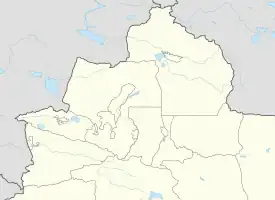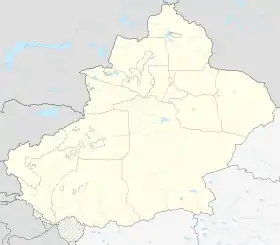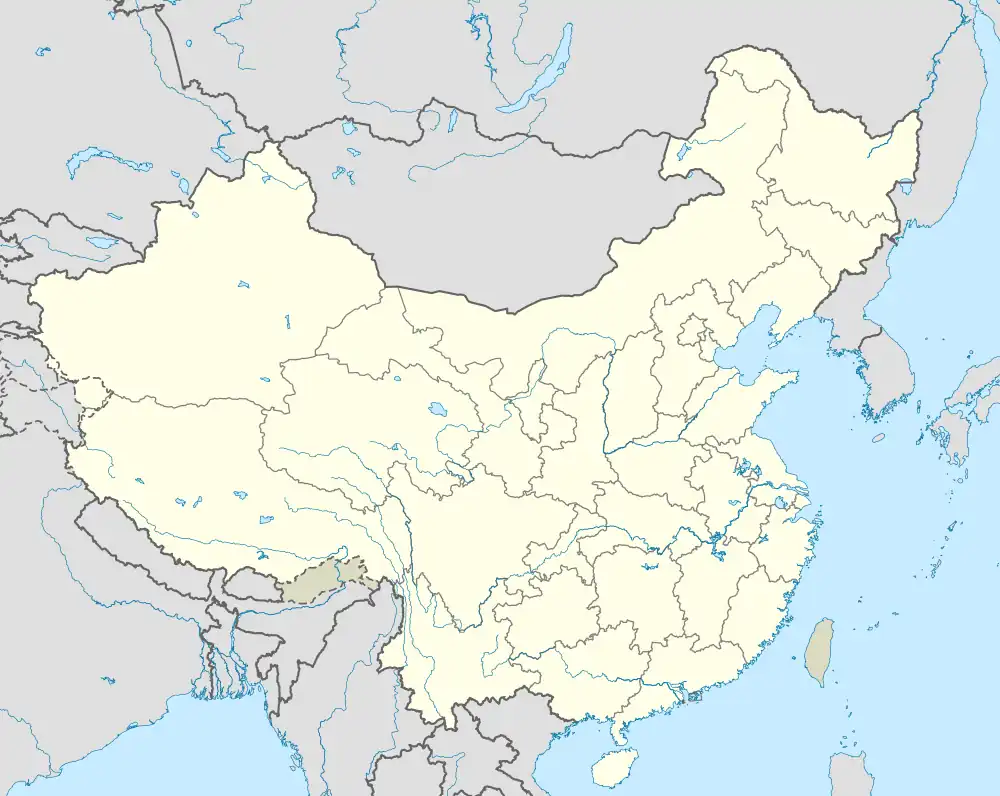Hutubi County
Hutubi County as the official romanized name, also transliterated from Uyghur as Kutubi County, is a county in the Xinjiang Uyghur Autonomous Region and is under the administration of the Changji Hui Autonomous Prefecture. It contains an area of 9,476 km2. According to the 2002 census, it has a population of 210,000.
Hutubi County
Kutubi | |
|---|---|
.png.webp) Location of Hutubi County (pink) in Changji Prefecture (yellow) and Xinjiang (light grey) | |
 Hutubi  Hutubi  Hutubi | |
| Coordinates: 44°8.627′N 86°56.91284′E | |
| Country | China |
| Autonomous region | Xinjiang |
| Autonomous prefecture | Changji |
| County seat | Hutubi Town |
| Area | |
| • Total | 9,517.53 km2 (3,674.74 sq mi) |
| Population (2020)[1] | |
| • Total | 192,638 |
| • Density | 20/km2 (52/sq mi) |
| Time zone | UTC+8 (China Standard[lower-alpha 1]) |
| Website | www |
| Hutubi County | |||||||||||||
|---|---|---|---|---|---|---|---|---|---|---|---|---|---|
| Chinese name | |||||||||||||
| Simplified Chinese | 呼图壁县 | ||||||||||||
| Traditional Chinese | 呼圖壁縣 | ||||||||||||
| |||||||||||||
| Alternative Chinese name | |||||||||||||
| Simplified Chinese | 景化县 | ||||||||||||
| Traditional Chinese | 景化縣 | ||||||||||||
| |||||||||||||
| Uyghur name | |||||||||||||
| Uyghur | قۇتۇبى ناھىيىسى | ||||||||||||
| |||||||||||||
Hutubi is 61.7 km (38.3 mi) by road north-west of Urumchi, the capital of Xinjiang.[2]
Subdivisions
Hutubi County is made up of 6 towns and 1 ethnic township.
| Name | Simplified Chinese | Hanyu Pinyin | Uyghur (UEY) | Uyghur Latin (ULY) | Administrative division code | Notes |
|---|---|---|---|---|---|---|
| Towns | ||||||
| Hutubi Town (Kutubi Town) |
呼图壁镇 | Hūtúbì Zhèn | قۇتۇبى بازىرى | qutubi baziri | 652323100 | |
| Dafeng Town | 大丰镇 | Dàfēng Zhèn | دافېڭ بازىرى | dafëng baziri | 652323101 | |
| Que'ergou Town | 雀尔沟镇 | Què'ěrgōu Zhèn | چۇرگۇل بازىرى | churgul baziri | 652323102 | |
| Ershilidian Town | 二十里店镇 | Èrshílǐdiàn Zhèn | ئەرشىلىدەن بازىرى | Ershiliden baziri | 652323103 | |
| Yuanhucun Town | 园户村镇 | Yuánhùcūn Zhèn | يۈەنخۇسۇن بازىرى | yüenxusun baziri | 652323104 | |
| Wugongtai Town | 五工台镇 | Wǔgōngtái Zhèn | ۋۇگۇڭتەي بازىرى | wugungtey baziri | 652323105 | |
| Ethnic Township | ||||||
| Shitizi Kazakh Ethnic Township | 石梯子哈萨克民族乡 | Shítīzǐ Hāsàkè Mínzúxiāng | تاشپەلەمپەي قازاق يېزىسى | tashpelempey qazaq yëzisi | 652323201 | (Kazakh) شىتيزى قازاق اۋىلى |
Climate
| Climate data for Hutubi (1991–2020 normals, extremes 1981–2010) | |||||||||||||
|---|---|---|---|---|---|---|---|---|---|---|---|---|---|
| Month | Jan | Feb | Mar | Apr | May | Jun | Jul | Aug | Sep | Oct | Nov | Dec | Year |
| Record high °C (°F) | 10.1 (50.2) |
4.9 (40.8) |
24.0 (75.2) |
35.4 (95.7) |
37.5 (99.5) |
40.2 (104.4) |
40.7 (105.3) |
40.2 (104.4) |
37.7 (99.9) |
32.0 (89.6) |
18.6 (65.5) |
9.0 (48.2) |
40.7 (105.3) |
| Average high °C (°F) | −10.5 (13.1) |
−5.9 (21.4) |
5.9 (42.6) |
20.1 (68.2) |
26.5 (79.7) |
31.3 (88.3) |
32.6 (90.7) |
31.3 (88.3) |
25.5 (77.9) |
16.0 (60.8) |
3.5 (38.3) |
−7.4 (18.7) |
14.1 (57.3) |
| Daily mean °C (°F) | −16.3 (2.7) |
−11.4 (11.5) |
0.6 (33.1) |
13.0 (55.4) |
19.5 (67.1) |
24.7 (76.5) |
25.9 (78.6) |
24.1 (75.4) |
18.0 (64.4) |
9.1 (48.4) |
−1.3 (29.7) |
−12.2 (10.0) |
7.8 (46.1) |
| Average low °C (°F) | −21.3 (−6.3) |
−16.6 (2.1) |
−4.2 (24.4) |
6.6 (43.9) |
12.9 (55.2) |
18.1 (64.6) |
19.6 (67.3) |
17.6 (63.7) |
11.3 (52.3) |
3.5 (38.3) |
−5.4 (22.3) |
−16.4 (2.5) |
2.1 (35.9) |
| Record low °C (°F) | −35.2 (−31.4) |
−35.8 (−32.4) |
−31.7 (−25.1) |
−9.2 (15.4) |
−1.7 (28.9) |
7.0 (44.6) |
10.0 (50.0) |
5.0 (41.0) |
−2.8 (27.0) |
−9.1 (15.6) |
−30.9 (−23.6) |
−36.7 (−34.1) |
−36.7 (−34.1) |
| Average precipitation mm (inches) | 7.6 (0.30) |
8.4 (0.33) |
11.9 (0.47) |
23.3 (0.92) |
25.4 (1.00) |
19.5 (0.77) |
23.1 (0.91) |
19.3 (0.76) |
12.5 (0.49) |
14.1 (0.56) |
15.7 (0.62) |
12.7 (0.50) |
193.5 (7.63) |
| Average precipitation days (≥ 0.1 mm) | 7.0 | 5.4 | 4.5 | 5.8 | 7.1 | 6.7 | 6.7 | 6.1 | 3.9 | 4.8 | 5.9 | 7.1 | 71 |
| Average snowy days | 13.8 | 11.9 | 5.4 | 1.6 | 0 | 0 | 0 | 0 | 0 | 1.1 | 6.9 | 14.2 | 54.9 |
| Average relative humidity (%) | 82 | 81 | 72 | 48 | 41 | 40 | 45 | 46 | 47 | 59 | 77 | 84 | 60 |
| Mean monthly sunshine hours | 134.5 | 153.7 | 227.9 | 272.8 | 315.7 | 314.3 | 320.9 | 312.9 | 280.1 | 239.6 | 150.8 | 110.7 | 2,833.9 |
| Percent possible sunshine | 46 | 51 | 61 | 67 | 69 | 68 | 69 | 74 | 76 | 72 | 53 | 40 | 62 |
| Source: China Meteorological Administration[3][4] | |||||||||||||
Transport
Hutubi is served by China National Highway 312, the Northern Xinjiang and the Second Ürümqi–Jinghe Railways.
Petroglyphs
Petroglyphs were recorded in Qutubi County at Kangjiashimenzi (Chinese: 康家石门子; pinyin: Kāngjiāshíménzi) and are interpreted as representing male fertility worship. This is because in the two depictions of copulation, the males have faces on their chests, suggesting that the petroglyph's creators believed that males were the source of children. The alleged superiority of the petroglyph's male subjects was the basis for the researcher's conclusion that they were created after 1500 BCE, when it is believed that matriarchal societies were replaced by patriarchies.[5]
Footnotes
- Locals in Xinjiang frequently observe UTC+6 (Xinjiang Time), 2 hours behind Beijing.
- Xinjiang: Prefectures, Cities, Districts and Counties
- http://disween.com/urumqi-13-cn/hutubi-13-cn
- 中国气象数据网 – WeatherBk Data (in Simplified Chinese). China Meteorological Administration. Retrieved 10 October 2023.
- 中国气象数据网 (in Simplified Chinese). China Meteorological Administration. Retrieved 10 October 2023.
- Wang Binghua (王炳华) (1992). 新疆呼圖壁生殖崇拜巖畫 [The rock-art of fertility worship at Hutubi, Xinjiang]. Beijing: Beijing Yanshan Press. p. 54.